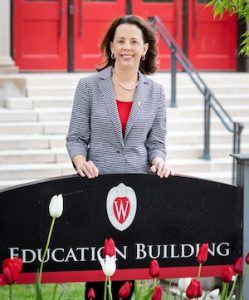What do students learn when they discuss controversial political issues in school? What are the benefits and limitations? How can teachers guide these discussions and maintain a positive classroom environment?

These are some the question’s that UW–Madison’s Diana Hess, dean of the School of Education and the Karen A. Falk Distinguished Chair of Education, tackled on a recent episode of the Education for Sustainable Democracy podcast, hosted by Brett Levy.
In the episode, titled “Teaching Discussions and the Election Aftermath,” Hess discussed her research into the benefits of talking about controversial issues in schools, and principles for fostering high-quality discussions in classrooms.
“I think it’s very, very important for students to see examples of high-quality discussion,” said Hess. “One of the problems is it is hard for them to see those examples in the world outside of school.”
Hess noted that a range research has found that students who engaged in high-quality discussions about controversial topics at school were more likely to be civically and politically engaged in later life.
Key to those discussions and fostering a positive learning environment, said Hess, are principles such as helping students get to know each other, establishing strong classroom norms, and modeling a spirit of inquiry.
Hear more insights from Hess by listening to the full podcast, here.